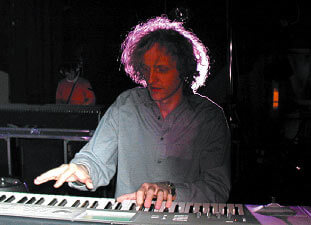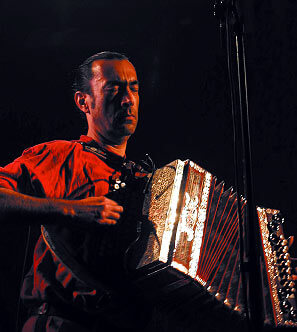IWASIG TOUR 2003
New world music without frontiers
Hubert von Goisern at Giller
Siegen. (wp) Hubert von Goisern follows the "old Alpinkatzen times" seamlessly. The audience comes in crowds to hear his new world music without frontiers. Supported by his excellent accompanying band, he will transform the tent theatre at Giller into a bubbling cauldron on Whit Monday.
You are currently swimming on a wave of success. Is that down to a wilder Hubert von Goisern coming into action?
Yes! I think there is much more excitement in my music now, it's less secretive than before. It also has a positive effect at my live shows, where I approach the people much more directly.
You long ago developed from a folk musician to a world musician. Nevertheless, you remain true to your own musical roots.
The understanding for my own traditions has consolidated through my Africa trips especially, after I noticed with what joy the people in Burkina Faso or Egypt live out their musical identity, and without frenzy of any kind. In Africa the time also stands still in a certain way. When I returned home, I realised how slowly I was suddenly moving, quite contrary to my fellow mid-European citizens.
Although you are seldom played on the radio, you are more popular than ever. Why is that?
I think that the audience is smarter than some bosses in the music business believe. I think that my success is a mixture of hard work and a lot of luck. In any case, I really appreciate that the public grants me a large advance in confidence. They just go along with it really well and are curious about what is happening with us musically. When you swim against the flow, you gain muscle. And you need muscle if you want to maintain your own vision of life and lifestyle.
You nevertheless refer to proven traditions. Only it has little to do with the sufficiently familiar folk music tradition.
In a creative process, you always need sources from which to draw. Mind you, the fact that I am closely connected to the musical traditions of the alpine region does not have to mean that unconditional love comes from it. You can also be closely connected to something in hate. Clearly it could be appealing to mix with the current schlager folk music scene, but you have no room for movement in these closely marked out circles. I don't have reservations with regards to this scene, only with the style of presentation, which, with permanent happiness, leads you to believe only in an ideal world. I also like to laugh and I don't like telling horror stories, but the world isn't only beautiful. Nevertheless, I think that the people at my concerts will still nevertheless have fun.
World music from Austria
Hubert von Goisern & Burkhard Frauenlob
 When
you hear the words Austria and music, you are quickly reminded of the
boozed up comrades in leather breeches, who wander like ghosts, dancing
and slapping their thighs, through kitschy TV scenery. Hubert von Goisern
has shown for years that these two terms can also be cast quite differently.
When
you hear the words Austria and music, you are quickly reminded of the
boozed up comrades in leather breeches, who wander like ghosts, dancing
and slapping their thighs, through kitschy TV scenery. Hubert von Goisern
has shown for years that these two terms can also be cast quite differently.
The widely-travelled musician combines the actually incompatible elements of folk music (and not folksy music which Caroline Reiber and Mr Moik always want to sell us as this very folk music) and rock and pop to make a successful mixture which is just difficult to beat in individuality and catchiness.
After the charismatic musician interrupted his musical career at the highpoint of his success in 1994, acted, wrote film music and produced two CDs with African and Tibetan music, he has now arrived in European pastures again. He has brought out three CDs within a year and a half which are bursting with liveliness and enthusiasm. Alpine yodels over Caribbean beats, polka and punk, today Goisern is more exciting than ever.
Keyboarder Burkhard Frauenlob and Hubert von Goisern spoke to us before the concert in Cologne.
What was your musical development?
Frauenlob: I am an Austrian and consequently I am always confronted with folk music. After accordion, church organ and many different bands, I studied jazz in Graz. Very top-heavy and theoretical. You don't play any more, and suddenly there are wrong sounds and right ones. Before, you simply played, without rules and after taste and hearing. What you absolutely don't learn there is the contact with keyboard sounds. Which work on the stage and which do not. It often takes half a year before you can really use a new instrument.
What equipment do you play live?
Mainly a Korg Triton, a Doepfer Masterkeyboard and a Kurzweil Micro Piano. The Doepfer has the most pleasant touch for me. I have a WahWah and a Ringmodulator Pedal for effects. It is my little set of instruments, because it is simply more practical than to drag along a real grand piano, a B3 and a Rhodes, although I believe that the recognition factor would be greater for the audience. When you hear an organ and there stands a B3, it is simply more believable.
Do you make your sounds yourself?
I mostly use presets, but I process them. Echo away and in the Master-EQ, the basses out somewhat. Then I push at the sound parameters. But completely individual sounds also go into action and I have likewise got combis and split sounds ready.
Can you identify with Hubert's music, or do you feel off course in the folk music corner?
I don't feel off course at all. Actually it is an advantage to play the music of your homeland. You have grown up with it and recognise yourself in it. It shapes. Apart from that, it is something different to play folk music with different elements, than what you equate with folk music today. That is namely folksy music and schlager and that is a commercial murder. It makes me puke. For me, folk music is a wonderful form of describing the big and small problems of everyday. Free from ratings and three minute boundaries. That is a very honest music. With Hubert, this mixture of cultures arrives on the scene which open up a whole new dimension.
How is working with him?
It is a constant search, as with an amateur band. I really like that, because with professional bands, you often have an arranger who passes everything forward. No free room remains for you.
 Hubert,
what was your musical development?
Hubert,
what was your musical development?
HvG: After playing the trumpet in Bad Goisern and school, I travelled the world for seven years and practised a great deal. When I was 30, I went to Vienna and only made music, closed all doors behind me and ended all jobs. I wanted to manage it just with music. I had set myself a deadline of 40. The first three years were hard, but then it worked. They were the best years, I was free.
With the music you play today?
No, not at all. I composed for a string quartet and made electronic and experimental music. I deeply rejected folk music.
How did you then come to folk music?
I was at home and my grandfather gave me his accordion. I really did not want it, but somehow the instrument appealed to me in a drunken stupor. I wanted to break it, and then the sound caught me. Hey, I thought, you can play rock'n'roll with that. In the clubs, in which I played at the time, this instrument was an affront. Folk music was taboo there, and there is actually nothing more exciting for an artist than to occupy oneself with taboos.
Nevertheless there were musical leaps in your career time and time again.
I think I am simply constructed that way. Again and again I look for new ways and modes of expression. That way you prevent routine.
What is the difference for you between African, Tibetan and European music?
In Africa, music is an essential part of life. There are an unbelievable number of occasions for which you play music and as a musician, you don't stand up on a stage, but in the audience. The people are much more extroverted and enjoy themselves much more. It is rather stiff here and you think that listeners and musicians are ashamed of their emotions. In Africa the music is more honest. The Tibetans are different in music. It is a lot about religion and meditation. Their music leads you into a dream world.
How does music develop for you?
It is moods, feelings which come over me, and often without me being conscious of it, I then go to an instrument and play this mood. Then sometimes I press the record button and record it. Often during this magical moments arise, which I stick at, and mostly something then comes out of it too.
